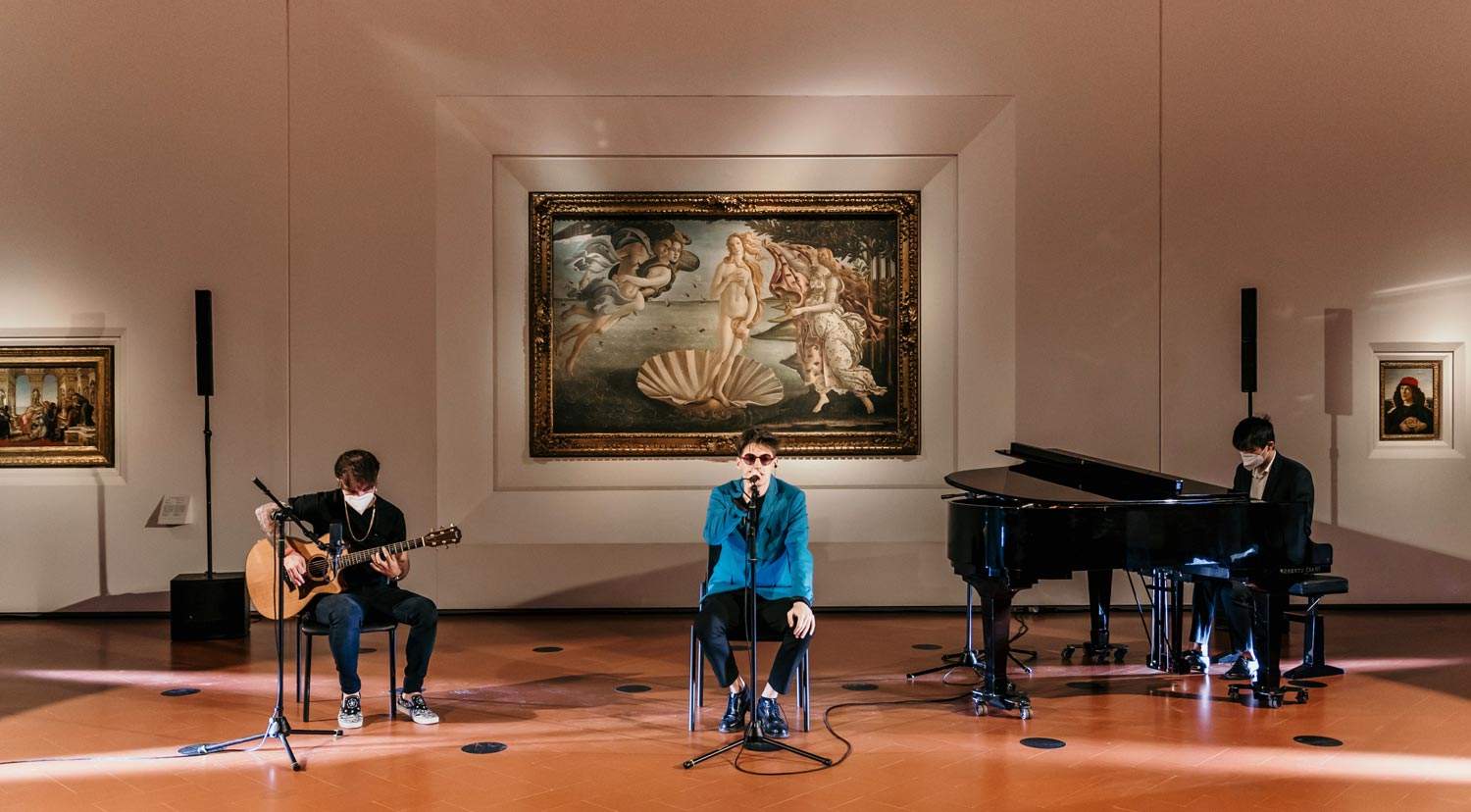Uffizi, singer Emanuele Aloia shoots video in front of Botticelli's Venus
More music videos in Italian museums: after several recent cases, such as Giulia Mutti at Palazzo Rosso (Genoa), Mahmood at the Egyptian Museum in Turin, and Andrea Sannino and Andrea Sannino at the National Museum of Capodimonte, the Uffizi Gallery also becomes the scene of a video clip. Performing in the halls of the Florentine museum, in front of Botticelli’s Venus, is the very young Turinese singer Emanuele Aloia, born in 1998, who has achieved success with his songs inspired by masterpieces of art history, such as Gustav Klimt’s Kiss, Edvard Munch’sScream, Van Gogh’s Sunflowers, and others.
Aloia went to the Uffizi today, on the occasion of World Art Day, which occurs every April 15, and recorded a live session in front of the Renaissance masterpiece performing one of his songs, Romeo and Juliet. In addition to the performance, the live show (which was broadcast on the Uffizi and Emanuele Aloia’s TikTok channels starting at 2:30 p.m., in a live broadcast watched by thousands of users, all or most of whom were young and very young) also featured a dialogue on the topic of the importance of art between Emanuele Aloia himself and Uffizi director Eike Schmidt. “I’ve never had a chance to visit the Uffizi before,” Aloia said in the video, “it’s the first time and it’s an incredible emotion.” Schmidt then explained, again live on TikTok, some of the details of the work. “We hope to be able to see it in the museum as well,” Aloia said, “and that people will be able to return to see this work and the works in general as soon as possible.”
The decision to perform the song in front of Venus is motivated by the fact that Aloia’s song contains some direct references to Botticelli’s work (“When you came it was a sunny day and if it rained the rain sang, / if you want to sit I’ll tell you a Botticelli story, you’re Primavera. / Without a meadow, without a flower, butterflies die alone, / without hate, without love I have no use for this heart, / And I tried to forget but it’s never easy, / enchantment and then revolution: the birth of Venus.”).
Emanuele Aloia, who was born in Turin and graduated from high school with a degree in linguistics, is a great lover of culture, art and music, and at the age of 16 began independently releasing several songs on major digital platforms. He got his first hit with the single Girasoli, released at the end of 2019, thanks to which Aloia reached the top spot on Viral Spotify and Gold certification. Subsequently, the single The Kiss of Klimt, released in April 2020 in the midst of a quarantine due to Covid-19, reached the first position in Viral Spotify, the top of the main Digital Stores and the second place in the TOP 50 Spotify in just a few weeks. It is also one of the most used songs in Italy on TikTok. Klimt’s Kiss allowed the young Piedmontese artist to obtain Double Platinum certification and at the end of 2020 it took the 20th position in the chart of the most purchased songs of the year within the TOP 100 FIMI Italy. Starting tomorrow, the singer’s first album, entitled Stendhal Syndrome, will be available on platforms.
“On the occasion of World Art Day,” said Eike Schmidt, “it is important to enhance visual art but not only: the arts are many, music is too. There is no distinction between the ancient and the contemporary, the contemporary gains from the ancient, the ancient gains thanks to the contemporary, and this is important: to unite the arts, the heritage of ancient art with the contemporary, and we celebrate it today, unfortunately alone, but connected thanks to social channels with all of Italy and the whole world.” The Uffizi director then extended “a big wish to everyone to return to the museums as soon as possible, and an invitation to come to the Uffizi: as soon as we reopen to the public, come and admire these works, maybe get inspired for a drawing of your own, a poem of your own, an engineering or computer invention or ... for a song!”
 |
| Uffizi, singer Emanuele Aloia shoots video in front of Botticelli's Venus |
Warning: the translation into English of the original Italian article was created using automatic tools. We undertake to review all articles, but we do not guarantee the total absence of inaccuracies in the translation due to the program. You can find the original by clicking on the ITA button. If you find any mistake,please contact us.




























